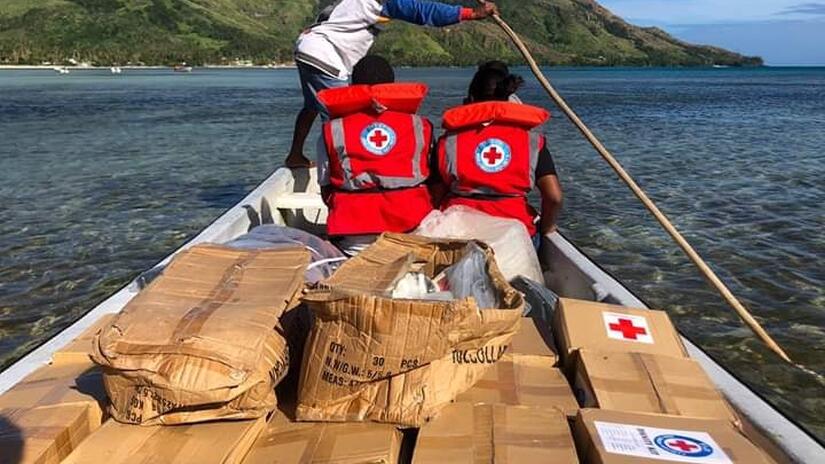Suva, 16 December 2020 – Two tropical cyclones have formed in the Pacific, signaling the beginning of what is forecast to be a busy season for emergency responders across the region.
Tropical Cyclone Yasa has been building strength between Fiji and Vanuatu and is tracking towards Fiji as a severe category 5 storm. Communities in Tonga have also been on high alert for Tropical Cyclone Zazu, which passed over the country bringing strong winds and heavy rain.
The sudden simultaneous storms reinforce predictions that tropical cyclones will be more frequent and there is more risk of floods this season due to the changing climate and La Niña weather conditions.
Red Cross societies across the Pacific prepare for the cyclone season all year, pre-positioning relief supplies, training volunteers and staff in everything from first aid to relief goods, and ensuring that communities know what to do when cyclones strike. This year these efforts have incorporated COVID-19 prevention.
Vanuatu Red Cross Society Secretary General Jacqueline de Gaillande said:
"We already have experience managing multiple disasters, following Tropical Cyclone Harold earlier this year, while dealing with the risks the COVID-19 pandemic posed to our communities. Our emergency response teams have all been trained on COVID-19 procedures and are ready to respond as needed.”
The Fiji Red Cross Society Director-General Ilisapeci Rokotunidau reiterates the importance of getting ready early.
“Disasters can strike at any time and we know that knowledge and preparation are critical for communities as they prepare for disasters. Our volunteers are, and will be, at the core of helping their communities to be ready and provide relief during this cyclone season.”
The 12 Pacific countries have an extensive network of more than 5,000 trained Red Cross volunteers working everywhere from the urban capitals to remote outer islands.
When Tropical Cyclone Harold hit Vanuatu, Fiji, Tonga and the Solomon Islands in April this year, more than 1,000 Red Cross volunteers were mobilized to support evacuation efforts and provide relief.
Head of the International Federation of Red Cross and Red Crescent Societies Cluster Coordination and Support Team in Suva, Kathryn Clarkson, said:
"Some of the same communities have been hit by five big cyclones in as many years and Red Cross will be there to provide assistance, as they prepare for another cyclone. Working in partnership with governments, Red Cross societies across the Pacific will provide vital support and information to help communities affected by cyclones maintain access to basic social services, and reduce the economic, social and psychological impact."
About IFRC
IFRC is the world’s largest humanitarian network, comprising 192 National Red Cross and Red Crescent Societies working to save lives and promote dignity around the world.
www.ifrc.org - Facebook - Twitter - YouTube

